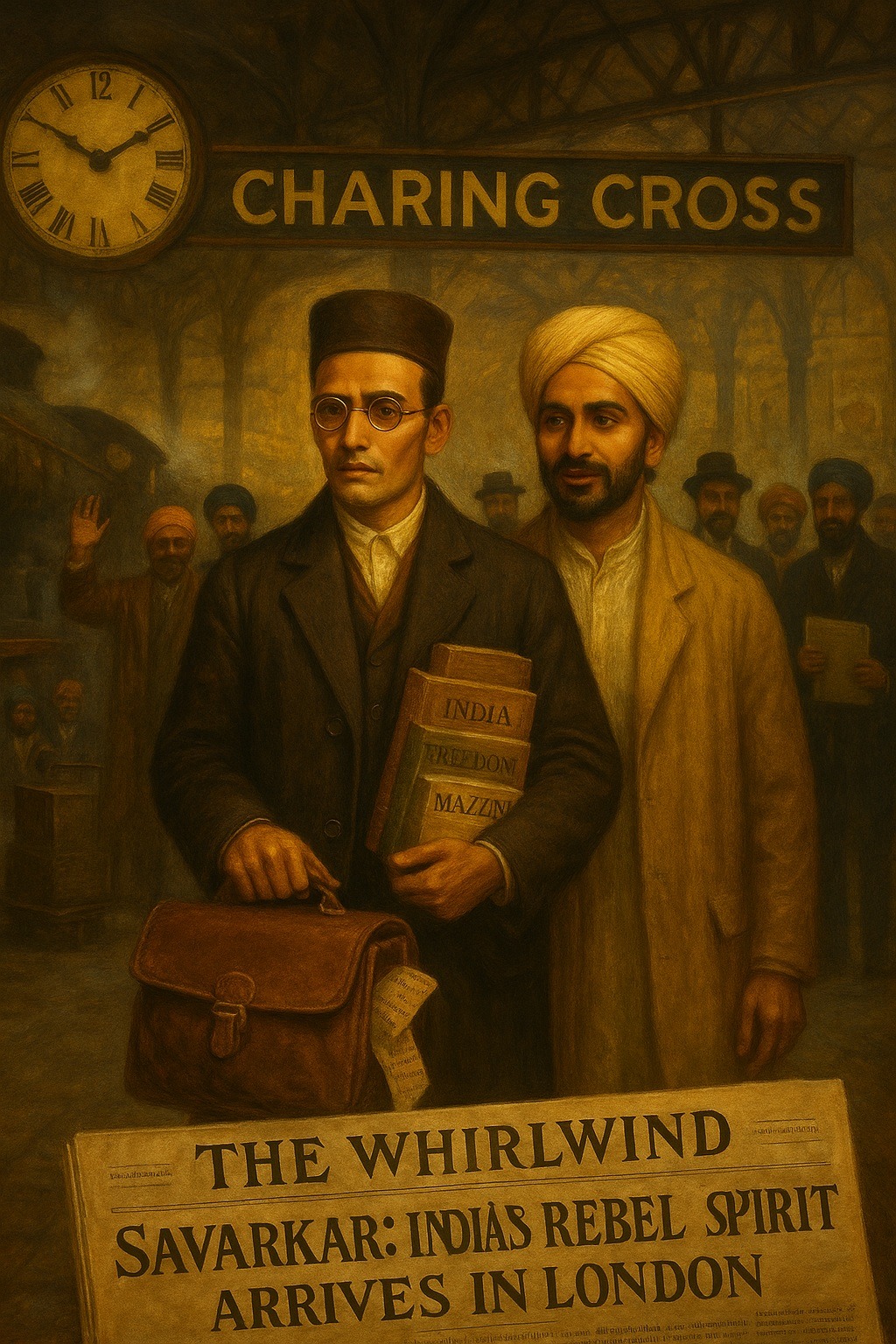On 9 June 1906, Vinayak Damodar (Veer) Savarkar departed Bombay aboard the S.S. Persia, embarking on a voyage that would decisively shape both his intellectual trajectory and his role in the Indian nationalist movement. While framed outwardly as a student’s pursuit of legal studies in England, the journey was imbued with deeper significance: it marked Savarkar’s deliberate entry into the imperial metropole — the very heart of the “enemy’s camp.”
The Voyage to Europe
The steamer’s course offered Savarkar his first sustained exposure to the wider world beyond colonial India. From Bombay, the S.S. Persia proceeded via Aden, traversed the Red Sea, and reached the strategic port of Suez — a crossroads of empire and commerce. Continuing westward, the vessel docked at Marseilles, where Savarkar set foot on European soil for the first time.
After a short stay in the French port city, he journeyed by train to Paris, then a center of revolutionary ferment, intellectual exchange, and political radicalism. Paris provided a symbolic backdrop for Savarkar’s passage, as it was here that many exiled revolutionaries of the nineteenth and early twentieth centuries had found both refuge and inspiration. From there, he traveled to Calais, crossed the English Channel by ferry, and disembarked at Dover, before completing the final leg of his journey at London’s Charing Cross station in early July 1906 (most likely on the 2nd or 3rd).
Arrival at India House
At Charing Cross, Savarkar was received by representatives of Shyamji Krishnavarma’s India House, a hostel and intellectual hub for Indian students in Britain that would soon become a crucible of nationalist and revolutionary thought. Among those present was Harnam Singh, a fellow passenger from the voyage, who altered his own plans in order to accompany Savarkar to India House. While other Indian travelers dispersed to pursue their personal goals, Savarkar’s decision to proceed directly to this center of activism underscored his political orientation and sense of mission.
The Inauguration of a Revolutionary Phase
Savarkar’s arrival in London marked the beginning of a transformative chapter in his life. At India House, he immersed himself in rigorous study, intellectual debate, and organizational work. London, the seat of British imperial authority, paradoxically became the stage where Savarkar sharpened his anti-colonial convictions, deepened his revolutionary strategies, and expanded his networks with likeminded radicals across Europe.
In retrospect, the summer of 1906 can be seen as a threshold moment: Savarkar had left behind the familiar world of colonial Bombay and entered the nerve center of the empire. In doing so, he inaugurated a period of ideological formation and political militancy that would leave a lasting imprint on the history of India’s freedom struggle.
How did Savarkar’s first encounters with Europe — through Marseilles and Paris — shape his exposure to global revolutionary traditions? In what ways did India House in London function not only as a hostel but also as a political and intellectual incubator for anti-colonial thought? How might Savarkar’s decision to go directly to India House, rather than pursuing a purely academic path, illustrate the fusion of intellectual aspiration and political activism? To what extent can Savarkar’s 1906 arrival in London be interpreted as part of a broader pattern of Indian nationalists engaging with the imperial metropole to subvert it from within? How does examining Savarkar’s time in London help us understand the transnational dimensions of the Indian freedom struggle? 👉 Share your thoughts in the comments below!
Sources:
KEER, Dhananjay. 1988. Veer Savarkar. Third Edition. (Second Edition: 1966). Popular Prakashan: Bombay (Mumbai).
PHAKE, Sudhir/PURANDARE, B. M. and Bindumadhav JOSHI. (Eds.). 1989. Savarkar. Savarkar Darshan Pratishthan (Trust): Bombay (Mumbai),
SAMPATH, Vikram. 2019. Savarkar (Part 1). Echoes from a forgotten past. 1883-1924. Penguin Random House India: Gurgaon.
SAVARKAR, Vinayak Damodar. 1993. Inside the enemy camp. Veer Savarkar Prakashan: Mumbai.
SRIVASTAVA, Harindra. 1983. Five stormy years: Savarkar in London (1906-1911) – A centenary salute to V.D. Savarkar. Allied: New Delhi.


Leave a Reply